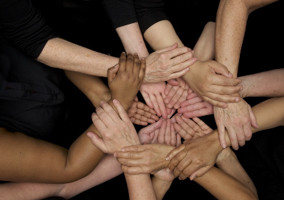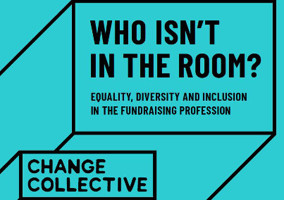Towards the end of last week, NCVO made a big announcement. Its next chief executive would be… Karl Wilding, currently director of policy and volunteering and sector lifer.
He’s also a white man, who has undeniably benefited from all the privilege that being a white man has to offer. This meant that once the initial wave of congratulations was over there were murmurings from some corners of the sector about the thorny issue of diversity, or the lack of.
On Friday, Debra Allcock Tyler, chief executive of the Directory of Social Change, tweeted: “@karlwilding is a super talent, I’m a fan & his appointment as CEO reflects well on him. He has my full support. But the appointment of a white man casts deep shade on the stated commitment of @NCVO Board to reflect diversity & inclusivity. Proud of him, disappointed in them.”
Then over the weekend Mandy Johnson, founder of Great Charity Speakers, wrote a blog where she too said she thought Karl would do an excellent job, but questioned whether white men should be stepping aside.
“The chances are that, if Karl hadn’t put himself forward, another white man probably would…and he may have been less qualified,” she wrote.
A flawed process?
It is right that when a white man is appointed to a position of power and authority there is appropriate scrutiny of the candidate and the process.
However, NCVO and Green Park, the recruitment agency that managed the process, have been at pains to show that it was a rigorous and considered process. Kai Adams from Green Park tweeted that there were 204 applicants. Half of the shortlist were female, and 38 per cent of them were BAME.
So, as an outsider, it feels difficult to suggest that they left some stones unturned.
If Karl was the best candidate, then it would be both illegal to appoint someone else and morally indefensible. It’s a tough job, and it’s only going to get tougher in the coming months.
NCVO’s chief executive has to both challenge the sector to up its game, defend it against unfair attacks and find a way to get its issues back onto a crowded public policy agenda. It’s not a job I would want to trust to someone who was the second most competent.
Those criticising the appointment of “another white man” to a top job all stressed that they have nothing against Karl personally and that they are sure he will do an excellent job.
No-one has suggested another candidate was passed over unfairly. Rather they’ve expressed frustration that in 2019, and given the current focus the sector has on diversity, that the best candidate was a white man.
This frustration that one of the most important, and high-profile roles in the sector has gone to a man is understandable. It is another reminder that the sector still has some way to go before its rhetoric on diversity and inclusion is matched by genuinely diverse workplaces.
Sending a message about diversity
Ahead of the announcement, there was a feeling that the appointee would be a woman. I think this narrative actually tells us quite a lot about how the sector is deeply uncomfortable with its lack of diversity at all levels.
If the new chief executive of NCVO had been a black woman, it would have sent a powerful message to both the sector and external stakeholders, and been helpful from a PR point of view whenever the sector is challenged.
But it would not have fixed the structural barriers that prevent or discourage people from putting themselves forward for leadership positions and securing them.
The sector shouldn’t be seeking to drive out white men, but ensuring that they are not given an easy ride at the expense of other individuals.
Representative bodies should not be judged just by how diverse they are but by how effectively they listen to the sector, amplify its voices, and get its issues on the agenda. This should include scrutiny of how well they champion those who do not look or sound like them.
In a way, the fact that the appointment of white man to a senior has led to this soul searching is a good thing; it shows the sector is self-aware enough to be uncomfortable with the broader problem.
But white men are not the enemy. Racists, sexist and prejudiced men are the enemy. It is usually pretty easy to separate the white men who are holding the door open and welcoming others into the room, from those who have slammed the door shut to protect their position.
The onus is now on Karl, NCVO and the whole sector to ensure that they step up efforts to make the sector truly diverse and inclusive. If the sector fails to meet this challenge there will continue to be lingering doubts about whether there might have been a better candidate out there every time a white man is appointed to a prominent role.
I’m not going to say that I hope that in 25 years the next CEO is not a white man. I hope that we’re not discussing their race or gender at all, but rather whether their skills and vision are what is needed to meet the challenges of 2044.
|
Related articles











